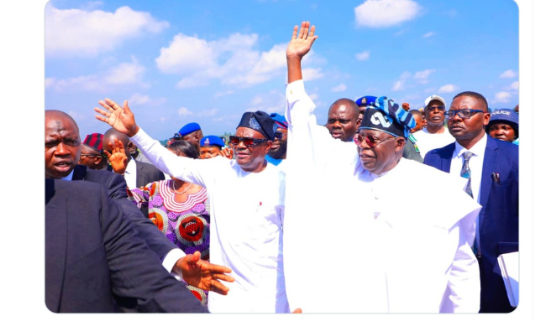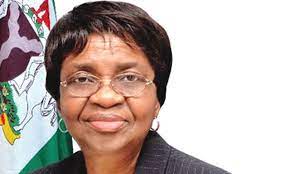By Paul Ejime
Lagos, Jan. 20, 2024- Sierra Leone’s former President Ernest Bai Koroma, accused of treason by the government of his country, arrived in Nigeria Friday on exile, although the Sierra Leone government is presenting his departure as “a medical trip.”
The journey, on a Nigerian Airforce flight, was originally planned for Jan, 4, but the government of President Julius Maada Bio went back on its earlier agreement with ECOWAS, apparently when the hawks in his ruling Sierra Leone People’s Party (SLPP) questioned the plan under the erroneous impression that ECOWAS was trying to prevent Koroma from facing justice in his country.
The political tension in Sierra Leone following the disputed June 2023 presidential election had heightened with an alleged coup attempt reported on Nov. 26, which the government blamed on officials of the opposition All Progressive Congress (APC), including former President Koroma.
Koroma has denied any involvement in the alleged botched coup, but he was placed under house arrest and after days of interrogation by state security agencies, he was taken to court on Jan. 3 and charged with treason.
Meanwhile, during the ECOWAS end-of-year summit in December 2023, President Bio had requested the regional economic bloc to send a mediation mission to Sierra Leone.
Consequently, the Chairman of the ECOWAS Authority of Heads of State and Government and Nigerian President, Bola Tinubu, dispatched to Freetown, a high-level delegation made up of the presidents of Ghana Nana Akufo-Addo and Macky Sall of Senegal, accompanied by the ECOWAS Commission President Oumar Alieu Touray and Ambassador Abdel-Fatau Musah, ECOWAS Commissioner for Political Affairs, Peace, and Security.
Sources privy to the Freetown meetings explained that it was President Bio who insisted that for peace reign in Sierra Leone, former President Koroma must leave the country, just like he (Bio) was granted political asylum by the United States after handing over power to now-late President Ahmad Tejan Kabbah in 1996.
Former President Koroma was said to have rejected the Bio suggestion, but following persuasion by the ECOWAS delegation, the three parties (Koroma, ECOWAS, and Bio) eventually agreed to the exile plan with Nigeria as Koroma’s host country.
This was on the condition that the Sierra Leone government should drop all legal and administrative charges against Koroma, who should also retain his entitlements as former head of state.
Diplomatic sources in Freetown and Abuja agreed on Friday that “nothing has changed, it is the same plan initiated by President Bio that is being implemented.”
This means that the Sierra Leone government only introduced the “medical trip element to save face,” after creating the wrong impression that the plan was being imposed on Sierra Leone by ECOWAS.
It is unclear whether ECOWAS will still favourably consider President Bio’s other request for ECOWAS to send a stabilization Force to Sierra Leone given the air of uncertainty in the country following the alleged coup attempt and disaffection over the June election.
The government said 15 of Koroma’s serving and former bodyguards are implicated in the alleged coup attempt, while the former president insists on his innocence.
The trial of suspects in the alleged coup attempt will be watched with keen interest now that Koroma is out of Sierra Leone, which is steep in ethnic division and identity politics, and yet to fully recover from the devastation of an 11-year civil war that killed more than 50,000 people and rendered hundreds of thousands as refugees from 1991-2002. (GBN)





